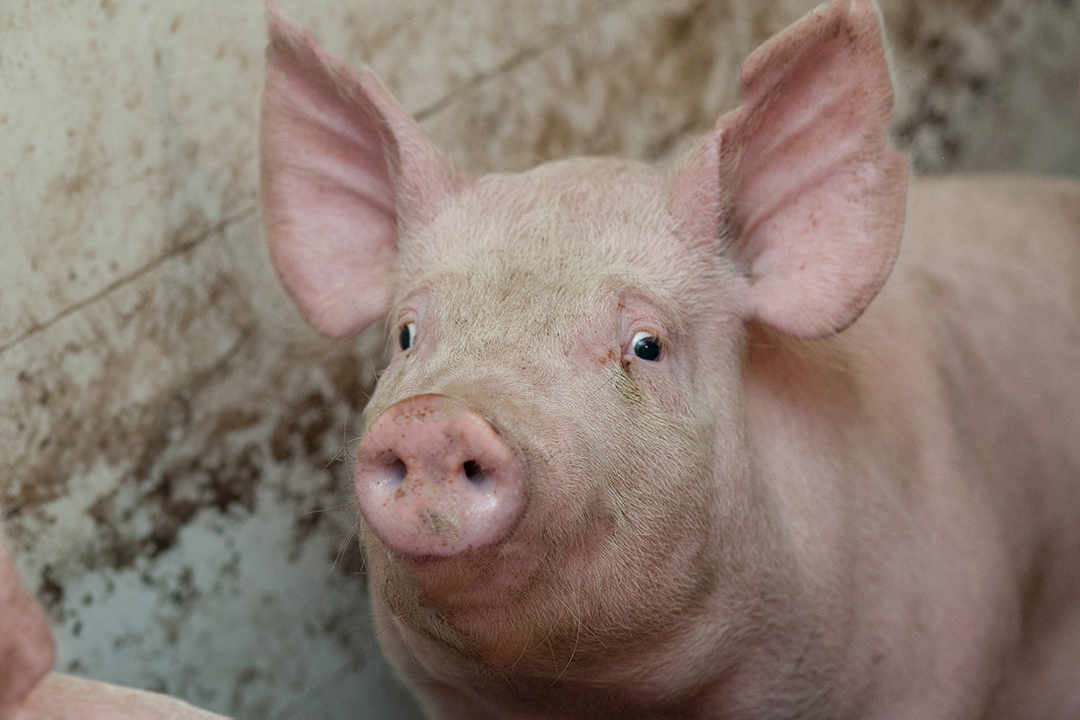
Treating diarrhea in pigs amid an antimicrobial resistance crisis
As antimicrobial resistance becomes a more urgent issue in animal and human health, western Canadian swine health scientists are seeking alternatives to antibiotic drugs for treating diarrhea in grower-finisher pigs.
By Cat Zens“The antimicrobial resistance pandemic is here, and one of the ways veterinarians can help address that is by using antimicrobials [antibiotic drugs] judiciously when treating animals,” says Dr. Matheus Costa (DVM, PhD), a specialist in swine medicine and an assistant professor at the University of Saskatchewan (USask).
Costa, who is a faculty member at the Western College of Veterinary Medicine (WCVM), is the principal investigator of a new study aimed at developing alternatives to antibiotics when treating and preventing diarrhea in grower-finisher pigs (large pigs weighing 30 to 120 kilograms). These animals can experience diarrhea in cases where they’re exposed to pathogens (disease agents) or experiencing stress.
Animals suffering from diarrhea don’t grow as quickly because they’re not absorbing all of what they eat. This health issue slows down the food production process, leading to significant economic losses for the swine industry and an increased carbon footprint. Diarrhea in pigs is also a food safety issue since it may be caused by Salmonella spp. or other zoonotic agents.
“It’s cheaper to grow healthy pigs than to grow sick pigs and producers strive to do that,” Costa points out. “If pigs are sick and we have to reduce [how much pork] we produce or we don’t have enough pigs to supply a market, it means that people may not have access to pork, and pork is the most consumed protein worldwide.”
Costa’s collaborators include University of Saskatchewan (USask) researchers Drs. Heather Wilson (PhD), Andrew von Kessel (PhD), Daniel Columbus (PhD) and Dr. Anatoliy Trokhymchuk (DVM). Dr. Eduardo Cobo (DVM, PhD) of the University of Calgary and Dr. Ben Willing (PhD) of the University of Alberta are also part of this multidisciplinary team.
The researchers aim to find antibiotic alternatives amid the global antimicrobial resistance crisis. One way of doing this is developing a vaccine for Brachyspira — a bacterium that’s a common cause for diarrhea in pigs. Vaccinating animals for both Brachyspira and Salmonella can significantly decrease the number of diarrhea cases in swine operations.
“If we can develop alternatives that will either reduce or completely replace antimicrobials, it means we can contribute to the ‘global pandemic’ of antimicrobial resistance by relieving selective pressure, and thus preventing the rise of resistant bacteria,” says Costa.
As well, researchers are looking at finding antimicrobial alternatives by using host defence peptides — small, antimicrobial proteins that pigs and other species naturally produce. Costa believes producing more of these peptides can aid in fighting harmful pathogens.
“If we are able to produce [host defence peptides] in a more specific and aggressive way, we can actually control the microbial population without actually inducing resistance because the mechanism in which these proteins act is different from antibiotic drugs,” he says.
Scientists are also looking at ways of blocking how bacteria cause illnesses in pigs. Specifically, Costa’s research team has identified molecular cascades (a series of reactions triggered by one molecule) that bacterial pathogens use to cause disease. They’re now investigating molecules that can block these molecular cascades to prevent further disease.
Costa’s research team is performing in vitro evaluations to determine if antimicrobial alternatives can protect cells from infection by disease-causing pathogens that cause diarrhea in pigs. If these tests are successful, scientists will begin conducting evaluations in live animals, potentially leading to antimicrobial alternatives becoming more commercialized in the livestock industry.
Costa hopes his team’s research can help other scientists develop strategies to treat diarrhea in pigs amid antimicrobial-resistant related complications.
“Not only will it be a major scientific and medical breakthrough, but we’ll also directly affect Canadians because producers will have a new tool that will hopefully replace or at least reduce the need for antibiotics,” says Costa.
This study is jointly funded by the Government of Saskatchewan’s Agriculture Development Fund (ADF) and the Government of Alberta’s Results Driven Agriculture Research (RDAR) fund.
Cat Zens of North Battleford, Sask., is a fourth-year student in the University of Regina’s School of Journalism. She worked as a research communications intern at the Western College of Veterinary Medicine (WCVM) in 2023.
